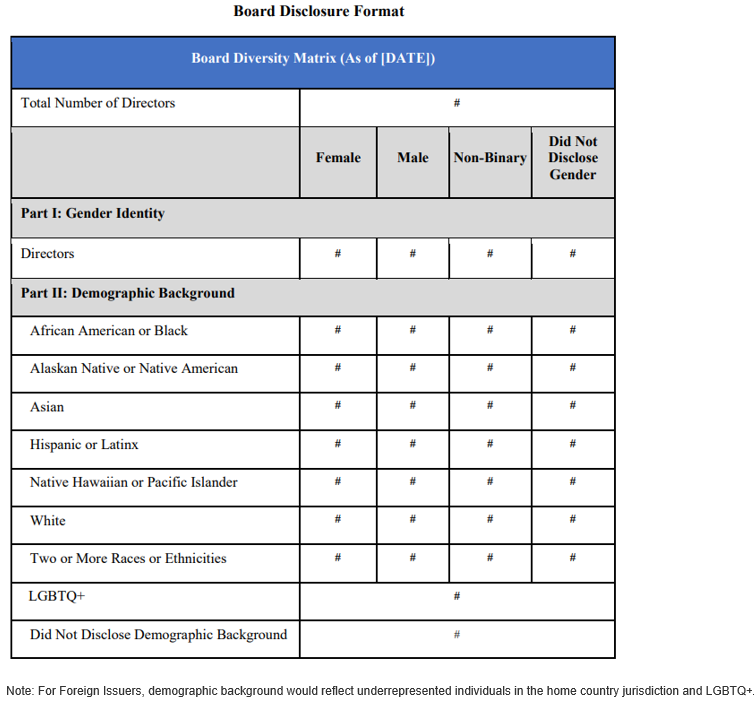SEC Approves Nasdaq’s Board Diversity Disclosure and Board Recruiting Service Proposals
BY ACCESSING THE FASB DOCUMENTS ON THIS SITE, YOU ACCEPT AND AGREE TO THESE FASB TERMS AND THE WEBSITE TERMS AS APPLIED TO YOUR USE OF THIS SITE OR ANY FASB LICENSED DOCUMENTS.
Under newly SEC-approved Nasdaq rules relating to required disclosure of board diversity, beginning in 2023 listed companies will be expected to have at least two diverse directors - one female and one under-represented racial or LGBTQ+ individual – and in 2022 publicly disclose certain board diversity statistics. If they do not have two diverse directors, listed companies will be required to explain the reasons why. To help provide access to diverse directors, Nasdaq is offering free board recruiting services for one year to certain companies.
Summary of Rulings
On August 6, 2021, the SEC approved Nasdaq Stock Market LLC’s (“Nasdaq” or the “Exchange”) proposed rule changes related to the Board Diversity Disclosure and Board Recruiting Service Proposals. All Nasdaq-listed companies, unless subject to certain exceptions, are required to have at least two diverse board members or explain why they do not. The new listing standard will also require disclosure, in an aggregated form, of information on the voluntary self-identified gender, racial characteristics, and LGBTQ+ status of the company’s board.
The rules provide for certain cure measures and periods if a company fails to comply with the new disclosure requirements.
In addition to the disclosure rule, the board recruiting service proposal gives certain companies access to Nasdaq’s and their partners[1] board recruiting services for one year, on a complimentary basis. This is intended to provide access to a network of board-ready diverse candidates for companies.
Required Disclosures
All operating companies listed on Nasdaq’s U.S. exchange will need to use the Board Diversity Matrix (pictured below), or a format substantially similar, to annually disclose board-level diversity data. Companies will provide this disclosure in the company’s proxy statement or its information statement (or if the company does not file a proxy, its Form 10-K or 20-F), or on the company’s website.

View examples of acceptable (i.e., same or substantially similar) and unacceptable (i.e., substantially different) disclosures by Nasdaq.
Additionally, a company that does not have at least two diverse directors, as defined above, is required to disclose why it does not meet the diversity objectives. Nasdaq will verify whether the company has provided an explanation but will not assess the merits of the explanation. That is, there is no “right or wrong” reason that a company may give for not having at least two diverse directors.
Effectiveness, Exemptions and Transitions
Disclosure of board diversity data similar to the data above will be required annually and companies have until the later of August 8, 2022 or the date the company files its proxy statement or information statement for its annual shareholder meeting during 2022.
With respect to the requirement to have diverse board members or disclose why the company does not meet the diversity requirements:
Based upon the company’s listing tier:
Nasdaq Global Select Market or Global Market companies are required to have (or explain why they don’t have) one diverse director by August 7, 2023 and two diverse directors by August 6, 2025
Nasdaq Capital Market companies are required to have (or explain why they don’t have) one diverse director by August 7, 2023 and two diverse directors by August 6, 2026
All companies with boards that have five or fewer directors are required to have (or explain why they don’t have) one diverse director by August 7, 2023
Smaller Reporting Companies can meet the diversity objective with two female directors, or with one female director and one director who is an underrepresented minority or LGBTQ+.
Newly listed companies (e.g., including IPOs and direct listings) and SPACs (including the post-merger registrant) have special phase-in rules.
Foreign Issuers can meet the diversity objective with two female directors, or with one female director and one director who is an underrepresented individual based on national, racial, ethnic, indigenous, cultural, religious or linguistic identity in the country of the company’s principal executive offices, or LGBTQ+.
SEC Approval
Many feel that this is step in the right direction to advance board diversity, which has been top of mind for investors. In approving these rules, SEC Commissioners Allison Herren Lee and Caroline A. Crenshaw issued a joint public statement indicating “NASDAQ’s proposal should improve the quality of information available to investors for making investment and voting decisions by providing consistent and comparable diversity metrics.” SEC Chair Gary Gensler stated that he believes that “these rules will allow investors to gain a better understanding of Nasdaq-listed companies’ approach to board diversity, while ensuring that those companies have the flexibility to make decisions that best serve their shareholders.” However, there is also dissent among SEC Commissioners Hester M. Peirce and Elad L. Roisman who, while supportive of Nasdaq’s board recruitment services and the goal of expanding diversity within the boardroom, question the legal basis for proposed disclosure requirements and delisting implications and whether the proposal is actually within the scope and purpose of the Securities Exchange Act of 1934.
Additional Resources
Nasdaq provided an FAQ publication on its new diversity rules.
1 To date, Nasdaq has established partnerships with Equilar, Athena Alliance, and the Boardlist to aid Nasdaq-listed companies that have not yet met the diversity objectives and would like assistance doing so. The services offered are complementary and are not mandatory. Here’s how your company can gain free access to Equilar’s BoardEdge Platform and Equilar Diversity Network, Athena Alliance’s community of women leaders, and the Boardlist’s premium talent marketplace.